This is the second in a series of essays on Russia, war, grand strategy and history.
Diplomacy is the politics of anarchy.¹ Grand strategy usually manifests itself through diplomacy, but in failure, as Clausewitz instructs us, war. I wave this semaphore to avoid confusion by opening a discussion on Russian grand strategy with an overview of diplomatic history. No longer a superpower, the United States is now a great power primus inter pares. The US, no longer able to dictate the politics of anarchy must learn to appreciate the rising risk of general warfare among great powers. Such a conflict is now probable before my generation shuffles off our collective mortal coil. Maybe next year, maybe in twenty. But facts are stubborn and China has superseded the United States in all but two or three of the most important measures of economic and military power.
We live in a revolutionary diplomatic moment. First, the eminent collapse of the global diplomatic order created by Kissinger and Zhou En-lai with the Shanghai Communiqué in 1972 is, if not already dead, dying. America’s perplexing abandonment of the triangular diplomacy§ that kept the then Soviet Union and its successor state the Russian Federation and China closer to the US than to each other, has further eroded the global balance of power out of America’s favor. The American grand strategy of the 20th century—prevent any single power or coalition of hostile powers from dominating the Eurasian landmass—has been surrendered to a 21st century foreign policy of cobbled together, ill-thought out and impulsive moves, engineered by small-minded think tank ideologues and the little men of domestic politics hoping to ‘make America great again.’ I doubt three out of hundred Americans understand how seriously we torpedoed our own power by abandoning a successful grand strategy in favor of limited ideals like the “dual containment” of rogue states or the policy to fight “two and a half wars” simultaneously as Madeleine Albright’s “indispensable nation” during the Unipolar Moment of the 1990s. But, denial is not a river in Egypt and so Thucydides’ trap∇ patiently awaits an irresponsible United States like a Praying Mantis.
Great power wars within the Westphalian system run in hundred year cycles.∅ The end of the Thirty-Years War in 1648 inaugurated the Westphalian world. Roughly a hundred years later the War of Austrian Succession begat the Seven-Years War, the first truly global war. The Treaties of Paris and Hubertusburg were signed in 1763, but left open more questions than the wars resolved.
Open diplomatic questions have a nasty tendency to war. Such were the misunderstood results of the 1763 peace, like the American struggle for Independence, arising out of England’s near bankruptcy. A reinvigorated French naval challenge to England and the domestic forces unleashed by French support of American independence attenuated the natural hundred-year gap between Great Power wars. These unintended consequences lit the French Revolutionary fuse that erupted in 1789 and ended in 1815. A renewed hundred-year gap ended with the Miracle on the Marne in September 1914. This Second Thirty-Years War, fought to settle Germany’s place in Mitteleuropa, ending in 1945 is a complete historical epoch. Taking the end of WWII in 1945 and subtracting the present year 2024 gives us an interval of 21 years in which the global balance of power continues to shift out of America’s favor and into China’s.
The balance of power is not some recondite or esoteric construct. It is a crucial gauge of power relations in an anarchic system. But it is a lagging indicator. Indeed, when the balance of power is re-established after wars or significant diplomatic denouements (e.g. the reordering of the European alliance system after the Diplomatic Revolution of 1756 or the combined effects of the Nixon-shocks that unraveled the post-WWII financial settlement of Bretton Woods in August 1971 and the subsequent rearrangement of the global order with the Shanghai Communiqué in February 1972) the results simply confirm what existed beforehand. The démarche or war confirms pre-existing facts on the ground, not as most believe, create new ones. Need I remind anyone of Dick Cheney’s Baudrillard-like post-modern comment on the Iraq war when he said, “we make the reality.” No, Dick, actually you do not. We lost in Iraq. But poor Dick’s limited horizons could not conceive that the politics of war are older than humanity itself. Our closest primate relatives, chimpanzees—not bonobos— play at politics identically. “[Primatologists have] concluded that rather than changing the social relationships, [chimpanzee] fights [and wars] tended to reflect changes that had already taken place,” remarks Lawrence Freedman in his book Strategy.”† A brilliant, if depressing, observation on the human condition.
Russian grand-strategy under Putin’s twenty-five year tenure has been quadripartite in nature. First, quash any and all separatist movements or insurgencies within the internationally recognized borders of the Russian Federation—to prevent a Soviet style dissolution of the entirety of Eurasia. Second, place all of Russia’s vast resources under the umbrella of state control. Third, subject to the completion of aim number two, Russia sought neocolonial controlling stakes over the vast majority of resources within the previous borders of the USSR—know as the Near Abroad. Putin’s fourth aim is to secure a non-NATO buffer zone, or sphere of influence, to the south and west large enough to keep Russia safe from invasion from those two cardinal points.
Of course, nuclear weapons do form a part of Russian grand strategy but they are a separate problem understood best within the context of the late 20th century arms control regime created by Nixon and Brezhnev, affirmed by Reagan and Gorbachev, and enlarged by Bush the Elder and Clinton with Yeltsin. For now, prudence dictates we proceed under the precondition that any war Russia fights will be conventional, that is until its existential interests have been breached. Adjacent threats are not direct, but there can be no denying (not-so) covert NATO, sorry, I mean Ukrainian attacks against Russian ballistic missile early warning radars are provocative in extremis. The Ukraine is not a nuclear power and without need or interest in destroying such radars. It’s NATO action.
Full stop.
Shrewd Putin shows more restraint than any contemporary Western leader possesses.² Just look at Macron flailing wildly about France fighting Russia—its historical ally! Or Polish President Andrzej Duda agitating direct NATO war against Russia. Sure, its lunacy but rational lunacy in a Polish context. But, with every new report of NATO, so sorry, I mean Ukrainian, skullduggery my sphincter tightens and I look to build a bomb shelter.
On 9 August 1999 Russian President Boris Yeltsin named then unknown Vladimir Putin as his prime minister. In September a series of apartment bombings, attributed to Chechen separatists, in Moscow and Volgodonsk killed over 300 people.‡ Most observers, including myself, believe this was a false-flag operation. Whatever the case, it succeeded in galvanizing the Russian people in advance of the Second Chechen War. Putin quickly eclipsed Yeltsin as president of the Russian Federation on December 31, 1999 and subsequently ordered the bombing of Grozny. Putin pursued the Second Chechen War with ruthlessness right up to its official non-official ending in 2009. For ten years Russia showed no mercy, raining destruction and death on Chechen town and village, combatant and civilian alike.
Why? Because the consequences of failure were so grim, not just for the Russian Federation, but for the world. Herein lies a significant failure of American imagination. Try and visualize the chaos of a rump Russian state ending at the Ob River and a dozen more sovereignties existing across Eurasia. The resulting power vacuum and disruption to the balance of power would have made the Balkans look like a Sunday picnic. Make no mistake, this is the terminal goal of former Undersecretary of State for Revolution and Chaos, Victoria Nuland, wife of neocon éminence grise Robert Kagan, should the Ukraine prevail. It’s insanity equivalent to opening a can of baby sand-worms from Arrakis in the Gobi Desert just to see what happens. Neocons, like Nuland, suffer from what I call khaophilia, from the ancient Greek meaning love of chaos. They are rubberneckers on the interstate whose stupidity cause mass pileups. Or as my Turkish buddy Murat said one gorgeous spring day of a young ne’er do well on the streets of İstanbul, “he has an uncontrollable desire to throw rocks at hornet’s nests and watch what happens.” Think Libya. But I digress.
The second arc of Putin’s grand strategy was complete within four years of his accession and election to the Russian presidency. By 2003 he had dissolved every independent media outlet and stripped all but the most dangerous of oligarchs of their power and assets, exiling many. He reserved the most severe punishment for his most serious and worthy opponent, Mikhail Khodorkosky. At the time Khodorkovsky was worth an estimated $15 billion USD and was CEO of Yukos, Russia’s largest oil and gas company. Putin had his assets seized by and incorporated into the state oil company Rosneft. Khodorkovsky was jailed on trumped up charges of tax evasion and convicted in 2005. Russia’s vast national resources were now under the control of the государство—the state.
The third goal of his grand strategy was decidedly neocolonial and took longer to achieve. However, by 2016 when I visited all but one of the Central Asia republics (Tajikistan) the resources of Uzbekistan, Turkmenistan, a goodly portion of those in Kazakhstan (reliably pro-Russian), and Kyrgyzstan appeared under the control of the Russian Federation. Russian TV news was on in the hotels and airports and every ATMs but one dispensed rubles not dollars.⊕ Only Azerbaijan gained a measure of independence, but it came at an enormous cost.
From 1991 forward Russia supported Armenia’s land-grab in Nagorno-Karabakh, a de jure part of Azerbaijan, but soon under de facto Armenian control. Following the first Nagorno-Karabakh War’s end in 1994 Armenia encouraged its citizens to populate the newly conquered territory, á la Israeli settlers gobbling up the West Bank. Russia’s aim to keep Azerbaijan divided and preoccupied had salutary second order effects, like limiting the interests of western oil companies in Azerbaijan. Not until 2023, after Turkey—infuriated by Russian attacks on its jets, soldiers and interests in Syrian Kurdistan—up-armed the Azeris with modern NATO armaments, were the Armenians summarily tossed out of Azeri territory. Claims of a second Armenian genocide are without merit. The Azeris committed no crimes against humanity. They waged war against an aggressor and ejected the occupier. Hyperbole is wasted on reality.
To Russia’s satisfaction the Transcaucasian nations remain divided. Azerbaijan, a Shi’ite nation, schizophrenically looks to both Iran and the US for guidance. Armenia, unwilling to accept defeat, choses selective outrage. Meanwhile an economic and demographic time bomb of its own making prepares to detonate. Then there is poor benighted Orthodox Christian Georgia. I recall sitting in Alex Rondeli’s Tbilisi office in 2003 discussing the future of Georgia and the possibility of joining NATO. This was in the immediate aftermath of Sheverdnadze’s ouster, the Rose Revolution, and Columbia University educated Mikhail Saakashvili’s presidency. Rondeli, to his credit, percolated ambivalence about NATO and American power. I perceived him as much more the pragmatist than romantic, as such terms relate to power politics. But his associate, one Timur Iakobashvili, was a strident true believer. He waxed poetic about America’s invasion of Iraq. He hectored me about our success at expeditionary warfare—the insurgency had yet to begin. And he was certain NATO would come calling.
“No, it won’t,” I said, “plus, á la perfide Albion, America will betray you the moment we lose interest in your part of the world.”◊ I fancy I got the last word but Iakobashvili got the Ambassadorship to the US.
Regardless, Abkhazia and Ossetia were shaved off of Georgia in the 2008 Russo-Georgian War. The nation, divided still, demonstrates the principle of divide and rule is as effective now as it was when the Hittites disastrously invaded Assyria in 1237 BC. Fortunately, most Georgian citizens have begrudgingly accepted this modus vivendi with the Russian Federation, much as Mexico accepts the giant of el Norte. Sometimes there is no choice. Sometimes you have to make the best bad choice. That’s the national interest in an anarchic world. Obviously, this suits Russia just fine, having the added benefit of a divided Georgia aligning with Russia’s interest in preventing NATO accession.
That brings us to the present moment. The matter at hand. Putin’s fourth and final grand strategic aim: carve out a large enough buffer between NATO and the Russian Federation that makes the costs of invasion from the south or west prohibitive. As I have shown, the Russian way of war is predicated on three easily comprehensible strategies. First, scorched earth tactics and the suffering of the Russian people.° Second, the ability to ‘spin up,’ recognize and promote learning generals while under distressing clouds of бардак—messiness.ƒ Finally, what has been left unsaid but demonstrated clearly in the three wars cited in my previous essay, is the Parthian, or steppe way of war: strategically trading space for time.
The Scythians first did this to Darius I of Persia in 513 BC, luring him ever deeper into the Pontic Steppe. The Parthians destroyed Crassus and his legions in 53 BC at Carrhae by trading space for time, suckering him down from the watered hills around Edessa onto the parched plains of Mesopotamia. The Seljuk Turks conquered half a world with such tactics first at the Battle of Dandanaqan in 1040 AD against the Ghaznavids, then at Manzikert in 1071 against the Byzantines. The Mongols won the greatest empire humanity has ever known on the backs of their horses, deep in the steppe, firing recurved bows. Even Tamerlane, scion of the Chingissid line and first of the gunpowder kings, defeated the Ottoman Sultan Yıldırım—the Lightningbolt—Bayezit at the Battle of Angora, leaving him to dash his brains out in a gilded cage as the Great Emir trudged back to Samarkand. Grant and his successors would call it the strategic defensive. This, combined with scorched earth tactics gives Russia enough time to marshal all her resources to mount a successful counter-offensive, as she did at Poltava, Borodino, and Stalingrad. The Ukraine (and Belarus) is simply the space Russia will trade for time.
It is important to recall that all Russia asked of the Ukraine, before the war began, was neutrality. But the Brits suckered the Ukraine’s Comedian-in-Chief into fighting against Russia as a cat’s paw for NATO. Whiskey tango foxtrot!
So now Russia destroys the eastern part of Ukraine, not to conquer, but simply preserve a large enough buffer so that any would-be invader can be met in Russian time, not invader time, and whereby be destroyed. Space for time has been and will remain the single most important and historically relevant aspect of her grand strategy, barring a nuclear exchange and even then, who really knows? Russian Eurasia is vast. Space for time is a vital interest to Russia. Victorious, she will dictate the peace, annex all Ukrainian territories in a line from Sumi in the north through Poltava, Dnipro on the east bank of the Dnieper River, Zaporizhzhiya, then south across to Kherson, Mikolaiv and finally the entire Oblast of Odessa. What will remain is a landlocked rump, near-failed Ukrainian state ruled by a corrupt Comedian-cum-Dictator, dependent on Russian good-will. Sovereign neutrality versus suzerainty? I know what I would have chosen.
“что делать?”ξ What happens after Russia defeats the Ukraine? What of her increasingly tight-knit energy for cash rapprochement with China? The Russians have clearly entered one of their “Russians are an Asiatic people” phases that cycle through the Russian intelligentsia every few decades like a recurrent case of giardiasis. Does this mean we are we looking at an Asiatic version of the pre-WWI Антанта (entente)? I confess my crystal ball is getting a bit foggy.
What will an emboldened, revanchist Russian grand strategy look like? What kind of forward actions will it take? Will it revive its navy and utilize the harbors of Syria to pressure Israel and project power into the greater Middle East? If so, the results might be beneficial to peace in the region. At the very least it will piss the Israelis off. Will it revive its relationship with Egypt, Nasser-like, displacing American influence and subsidies? At risk of a two front conflict against Iran and Egypt? That might chasten the Israelis into some kind of acceptance of international norms. At the very least it’ll sober ‘em up from their decades long binge of oppression against the Palestinians. Will Russia super charge its submarine fleet in the North Atlantic? Threatening NATOs key re-supply line? Will it find a unique way to avoid war but pressure the Baltics into leaving NATO for a pre-World War One Belgian-like guaranteed neutrality? Will it support a Chinese invasion of Taiwan? There is a non-zero chance that each and all of these might happen and more. Russia has regained a decent share of the stature it lost globally when the USSR dissolved. Not all of it, however, and so she is a spoiler on the international stage, albeit a big one. Nor should she be underestimated.
And yet . . .
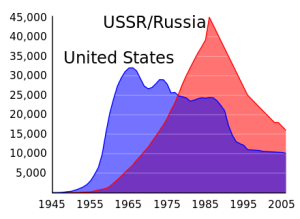
U.S. and USSR/Russian nuclear weapons stockpiles, 1945-2006 under the nuclear arms control regime of the late 20th century.
Of course, the majority fault lies with America. Presidents Bush the Younger, Obama, Trump and Biden foolishly drove a heavyweight continental power, former and potentially future ally into the arms of our biggest international competitor, China. I don’t know about you, but I would have preferred Russia on our side fighting the land war when the big show against China begins in earnest. With the right coalition, one including a Russian threat to China’s rear, the Middle Kingdom can be defeated. Sadly, the march of folly begun with the abrogation of the ABM Treaty by Bush the Younger in 2002 accelerated with the abeyance of the INF Treaty in 2018 by Trump, leaving the nuclear arms control regime began by Nixon and Brezhnev, solidified by Reagan and Gorbachev and expanded under Bush the Elder and Clinton, in tatters. We world citizens are left to live, once again, at very real risk of nuclear annihilation. What a shame small minds presided over such potential.
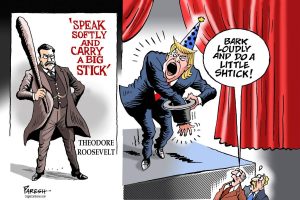 Obviously the horizons of American diplomats have never been very far or wide. Certainly not enlightened enough to embrace or understand men of foresight like Teddy Roosevelt, Henry Kissinger, and James A. Baker, III. After all, banality of banalities, the business of America is business. Let’s have featherweight Warren Christopher be our Secretary of State! How about Madeleine Albright or even cage-match Condi? Anthony wet-Blanket anyone? Such choices leave me disgusted.
Obviously the horizons of American diplomats have never been very far or wide. Certainly not enlightened enough to embrace or understand men of foresight like Teddy Roosevelt, Henry Kissinger, and James A. Baker, III. After all, banality of banalities, the business of America is business. Let’s have featherweight Warren Christopher be our Secretary of State! How about Madeleine Albright or even cage-match Condi? Anthony wet-Blanket anyone? Such choices leave me disgusted.
What’s even more dangerous is American worship at the ‘Church of the Divine Belief in the Steadfastness of Our International Friends’. Does it have a pope? How many brigades does he have? Alas, nothing is sillier or more dangerous than such blind adherence. Our European allies are freeloaders, sipping their cafe au lait under an America tax-payer financed security umbrella while the sun sets on Western Civilization. Don’t misunderstand me, I get Europe’s reluctance to rearm and/or countenance war of any kind after the catastrophe of the early 20th century.
But, folks, let’s get real for a moment and recognize truth.
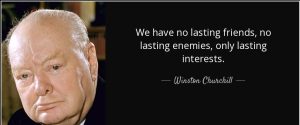 No nation has steadfast friends. Nations have only implacable, insatiable interests. When those interests align, you get harmony. When they do not, you get conflict, revolution or war. This is the way of the Westphalian system, established in 1648 and now global in scope. We fool ourselves trusting the panacea of international law and/or a rules based order.
No nation has steadfast friends. Nations have only implacable, insatiable interests. When those interests align, you get harmony. When they do not, you get conflict, revolution or war. This is the way of the Westphalian system, established in 1648 and now global in scope. We fool ourselves trusting the panacea of international law and/or a rules based order.
In Westphalia there is only anarchy, self-interest and impermanent security. For if one nation has absolute security, then all others are absolutely insecure.
¹: In the Westphalian order there is no mutually agreed upon global government or mechanism with a monopoly on violence to enforce peace. There is a word for this: anarchy.
§: The Wikipedia entry on Triangular diplomacy is 85% rubbish and 15% cherry-picked quotes. The concept behind triangular diplomacy is simple, to paraphrase Kissinger: keep relations with our peer competitors closer to us than they are to each other. The Wikipedia entry is a self-fellating perversion of the original concept. Donald Trump wouldn’t know triangular diplomacy from a parallelogram, nor would Anthony Blinken.
∇: The Thucydides trap, a phrase coined by scholar Graham Allison, pertains to the challenge of a rising power opposing the defender of the status quo and the resultant breakdown of diplomacy, then almost universally followed by great power general warfare. For example, Athens rising, Sparta status quo. United Kingdom status quo, Germany rising. Dozens of other examples exist throughout history.
∅: It is crucial to note that I am discussing warfare and grand strategy within the Westphalian system, a system that now dominates the globe. There were plenty of devastating wars all over the world between 1648 and 1900. But, generalized global warfare under the Westphalian system is materially different and not all state actors were apart of the Westphalian system until the 20th century.
†: Freedman, 2013, p.4. I’d further highlight that chimpanzees and bonobos are the Yin and Yang of mankind’s warring sides.
²: this essay was written before NATO forces, French, Polish and Ukrainian made their incursion into the Kursk Oblast of Russia, which makes my comments even more appropriate and predictive.
‡: It’s September of 1999, I don’t recall the exact date, but it was around 11:30 pm or so, I was sitting in the original Moscow McDonald’s on the corner of Bronnaya and Tverskaya ulitsas. In 1999 McDonalds was still a status symbol to Russians so I humored my business associate, Volodya, with a Биг Мак. The moment we sat a boom rang out, followed by rattling windows and the soft shaking of the building. An earthquake in Moscow? Everyone except me hit the floor. The immediate danger gone, we all went outside looking up and down Tverskaya ulitsa. To the southeast a column of smoke rose, barely visible behind the Kremlin floodlights atop the Trinity tower. Volodya turned to me and said in Russian, “those fucking Chechens are all going to die now.” He was not far off the mark.
⊕: The sole holdout was an ATM in Osh, Kyrgyzstan that spit out Chinese Yuan. What do you think that presages?
◊: La perfide Albion, French for Perfidious Albion refers to the diplomatic treachery of England. And yes, I really said this to him. I would also note Scott Ritter made virtually identical comments about Georgia in a podcast yesterday. Fast forward to the last seven minutes.
°: “Shonik, don’t worry about us,” my Russian ex-wife used to say, “we’re used to it. We’ll endure.”
ƒ: Thank you reader ‘j’ for this wonderful concept.
ξ: “What is to be done?” Vladimir Lenin, Saint Petersburg, 1902.
Kelley lives in San Antonio, Texas. He has a Bachelor’s degree in European History, and two Master’s: International Relations and Political Economy and another in History, focusing on the medieval trade routes of Inner Asia.


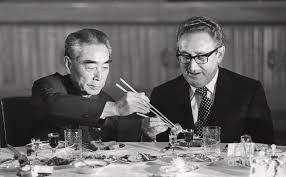

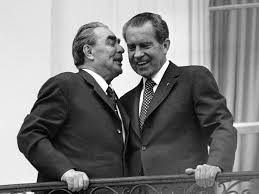

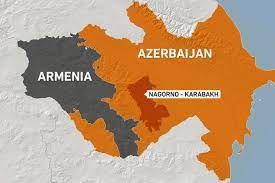

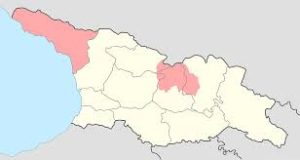
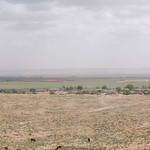

Tallifer
Imagine if Russia had taken the course toward prosperity, democracy and peaceful coexistence that Poland and the Baltic states have successfully pursued. Imagine if China had likewise?
Sean Paul Kelley
@Talifer: Putin was just reelected with an 80% majority. Zelensky is a dictator who canceled presidential elections in May. The Verkhovna Rada is now an illegitimate rump parliament, having canceled elections. I would also remind you that in our lifetime two Republican presidents have been selected by the Electoral College, an undemocratic body, over the will of the American popular vote. We do not live in a democracy. We live in an oligolopalistic republic.
Americans truly believe they live in a democracy, but they do not.
And peaceful existence with Poland? Did you misunderstand it when I said there were Polish NATO forces fighting in Kursk? How is that peaceful coexistence?
Sean Paul Kelley
@Talifer: not to be rude, but you clearly have no comprehension of just how important the Shanghai Comminqué is and was, or how America has begun undermining it since Bush the Younger’s presidency. We’re not interested in peaceful coexistence. Just look at the counter-attack on president’s successful policy of detente with the USSR. He was forced out of office for imaginary crimes, crimes that are a bake-sale compared to the real crime of waging pre-emptive aggressive warfare of Bush the Younger.
Feral Finster
With all due respect, it should be abundantly obvious that there is no grand strategy here, no master plan.
Russia does not want to fight the Ukrainians that it still sees as misguided brothers. Russia does not want to fight The West, the Russian leadership wants to join it.
Of course, the West sees things very differently. As far as they are concerned, Russia can either be an enemy or a vassal, and there isn’t much difference.
Sean Paul Kelley
@Feral Finster: you are correct on point two and half-correct on three. Russia did not want to fight in the Ukraine. The West does want a dissolved Russian Federation. It is the explicitly verbalized goal of Victoria Nuland. But a Russian enemy, with renewed industrial capacity outstripping the combined arms merchants of the West? No, they do not want that kind of enemy–and that kind of enemy, aligned with China, either by friendship of harmonious interets–is decidely not a vassal state.
As to your first assertion: I think I’ve outlined and suported a pretty clear strategy based on multiple visits to the Russian Federation, not to mention just about every nation of the former Soviet Union, a life-long study of Russia and observaton of Putin since my first experience of his actions in September of 1999. As you said, with all due respect–I too am not here for a pissing match–but what do you bring to the table? I realize this is argument by authority–but do you have any specific material experience with Russia or Russians or the Russian goverment that supports your assertions? It’s a sincere question.
Carborundum
A couple of random thoughts:
1) I think it probably makes sense to mentally model the US (and China) as super-powers. If it worked conceptually for US – Soviet competition, I think it works here as well. There are some pretty key differences in the nature of the networks arrayed around each paramount power, but I don’t think those differences are enough to outweigh the similarities with the previous mental model. Anything that encourages the current crop of diplo-weenies and politicians to look at any history prior to ’89 and after ’45 would be useful. The late 90s and aughts bred some really stupid reflexes and the number of adults in the room with direct experience who aren’t mainly building monuments to their supposed end of the Cold War legacies is trivial.
2) I strongly disagree that nuclear weapons are an element of grand strategy that can be understood separately. The very notion that we should assume that they are a brake on any success in conventional conflict amply demonstrates that – this (manufacturing chips), in the main, is what nuclear weapons are for and the Russians have played (or tried to play) this card a lot. I strongly suspect that part of the reason why this conflict has gotten to the level it has is because Western intelligence assesses that Russian strategic forces are significantly less of a threat than billed. [Relatedly I would assess targeting of ABM assets as an indicator of how little control Western forces have over Ukrainian actions. They’re trying very hard to hit sensational pain points to increase perceived costs – pretty much anything is potentially in the target folder, if it can be reduced with unsophisticated weaponry and demonstrates Ukrainian freedom of action within Russian territory (if folks think most of these deep strikes are launched from Ukraine proper, I would urge them to think otherwise).]
3) A military grand strategy that boils down to trading space, blood and treasure for time is not a great one for the modern world. Pretty much the entire focus of the past couple hundred years (scientifically, economically, politically, militarily etc.) has been about devaluing space and compressing time. With that in mind, IO and perception shaping operations are, I think, a lot more central to great power competition and strategy than people think (even though they are fantastically cheap) and have to be an element here. I don’t think it’s a coincidence that the Internet and the associated profusion of crap data and passionately vocal dumb-assery is making us all markedly dumber and decision making worse. The further they can keep from having to trade space and resources for time, the better I think they will view it.
Oakchair
China has superseded the United States in all but two or three of the most important measures of economic and military power.
—-
China has more manufacturing then the Eurozone and America combined.
China is the leader in inventions and scientific research.
China has the largest economy which is almost as large as the EU and America combined.
In a year all of NATO can’t even produce the military’s goods Russia produces in several months.
What important measures is China not ahead of America?
—-
Khodorkovsky was jailed on trumped up charges
—
Does anyone actually doubt a billionaire oligarch didn’t commit tax fraud and crimes? At best the rules were applied to him instead of being ignored as is status quo for the ruling class.
—-
Imagine if Russia had taken the course toward prosperity, democracy and peaceful
—-
Exactly, if Russia in the last 25 years hadn’t destroyed, overthrown the government, or attacked the countries of Serbia, Ukraine, Afghanistan, Iraq, Syria, Libya, Yemen, Palestine, Iran, Lebanon, Pakistan, Somalia, Bolivia, Haiti, Venezuela, Honduras, Cuba, Burkina Faso, Chad, Gambia, Guinea, Mali, Mauritania , Niger… Oh wait…
Sean Paul Kelley
@Oakchair: brilliant.
Sean Paul Kelley
@Carborundum:
Point by point reply. First, China as superpower. Disagree. USSR and USA were superpowers for two primary reasons. First, each could project real power globally. USSR had aircraft carriers and global proxies, e.g. Cuban soldiers supported by Russia fighting in Angola. Second, each had an enormous arsenal of nuclear weapons. China has not yet acheived any kind of power projection capacity like the former USSR. The Russian Federation is rebuilding some of that power to project outside the near abroad, see Syria for example. China has only 350 nukes. Makes for a seriously painful deterrent, but not a globe-killer. Responsible if you ask me. But, India is building out carrier capacity to protect its oceanic interests. It does after all have an ocean named for it. Iran will become nuclear in the next five years. They’ve been saying this for the last twenty. However, the point I am making here is there now exists a multiple of great power poles. China, India, Russia and USA, not to mention UK nukes and France’s force de frappe, and UK has two or three jump jet carriers, as does France. So, we go from four poles to almost six? I disagree with your view on China as superpower, but in time I can be persuaded.
Point two: I agree completely. So, allow me a recension in my language. I wanted to divorce nukes from strategy in this essay for reasons of space. It would have turned into a 4,500 word essay instead of 3,200. No one wants to sit at the internet and read 4,500 words. TL;DR. Know what I mean? So, the error is mine. I accept it. But I think you understand my reason for eliding that conversation better now, yes?
Third: I could not agree more. Doesn’t mean its not a part of their strategy or that catastrophe won’t happen. Sometimes you get Hitler, other times George Washington. Know what I mean?
All in all, we agree pretty comprehensively.
Sean Paul Kelley
@Oakchair: one measure, USA still has better GDP per capita. But this is at the core of US incomptency: it is statistical legederdemain. The rest of the world uses the much easier to comprehend and realistic GDP PPP, by which measure if I am not mistaken, China is ahead of the US. That’s one. Total military spending as both a % of GDP and nominal value is higher than China’s $471 billion, or 4.2% of GDP. US spends $1 trillion on defense, inching up to 7%.
As for Khodorkhosvsky. Fair enough. Please do recall, he was the only oligarch prosecuted and jailed. So, as I agree with your response, allow me to correct my language: he was inequitably prosecuted, as other oligarchs should have been. Khodorkhovsky was a real threat to Putin, thus persecuted.
StewartM
Talifer
Imagine if Russia had taken the course toward prosperity, democracy and peaceful coexistence that Poland and the Baltic states have successfully pursued.
We had that chance, with Gorbachev, which would mean social democracy (and likewise, a happy country, given its track record). But our Western leaders wanted nothing less than full-bore capitalism, so they backed Yeltsin and the breakup of the USSR and Yeltsin gave it to them. (I’d also say that the last thing they wanted was yet another success story for “socialism”).
But Kelley is right, and right not just about the former USSR–breaking a state down into innumerable smaller, less stable, more unpredictable, political entities is just asking for trouble. I’m amused by Americans in particular who both condemn secession when it comes to US states but “support Ukraine” and say that every locale elsewhere on the planet has some ‘right’ to be fully independent. Heck there is no country in the world that doesn’t have regions that might want to be their own country (Wales? Brittany? Bavaria? Wallachia?).
As the opponents to US secession noted, you can’t have any government if the minority can then just decide that they’re taking their ball and quitting.
StewartM
I agree with most everything you wrote, save that humans are closer to bonobos than common chimps. (For starters, ever notice we don’t have a mating season?). Maybe it’s our leadership (a tiny fraction of us) that’s closer to common chimps.
I also note how all those who favor separatist movements in the former USSR, don’t think so well of separatist ideas within their own country. Ukraine has this inalienable right to be state, but not Texas, eh? The fact is that not only do larger political entities provide stability, in fact they ironically also provide support for minorities. I say this as a US southerner who knows that the treatment of our African-American population (and others) was at least tempered a bit by being a part of a larger whole that could protect these minorities against the worst intents of a local majority. The former USSR wasn’t perfect on this (who has been?), but was better than most states in accommodating its various nationalities.
Carborundum
Concur, we very substantially agree. Appreciate your additional clarification.
My view on the definition of superpower, with the benefit of some hindsight, is that we placed far too much emphasis on military power and too little on other dimensions. Yes, the US can project power at levels that no other actor (or even likely group of actors) can match. However, the utility of that power has been shown to be a lot less than we assumed back at the height of superpower competition (and I think the utility function may actually be decreasing over time). Relatedly, the USSR was imputed to have a *lot* more military power than it actually proved out to have. [Turns out that Soviet Military Power wasn’t DIA’s pinnacle analytical product. ;)] Similarly, when we look at the nuclear dimension, it turns out we were all massively overbuilt (CINC STRATCOM publicly assessed he could effectively service his global target array with 600 deliverable devices – probably that number has increased a bit, but I’d bet it remains a tiny fraction of peak superpower stockpile). Bottom line, I think we made a lot of assumptions about what military power was, what it got us and who was and was not powerful that I don’t think made a lot of sense at the time and make even less sense now.
Bottom line, my assessment is that the Chinese are consistently doing very well along dimensions of competition that have long fallen out of favour among complacent Western powers who *wish* defence was so key to great power competition. It is this that I think of most when I conceptualize them as a super-power.
When I look at the current situation, it seems to me things are somewhat different from the Cold War one in (at least) two key ways:
1. there are larger gaps between the paramount powers at network centre and the array of secondary and tertiary powers arrayed around them, and
2. there’s much more direct interplay between the two networks by non-paramount members of the two networks than there was previously; with higher levels of integration, all the non-paramount players are a lot more like non-aligned movement members than in the previous incarnation.
mago
Regarding chimpanzees and bonobos and the yin and yang of it chimps are yang, bonobos yin.
It’s kind of like the Old West where men are men and sheep are sheep. (Sexual reference—especially concerning bonobos.)
But never mind.
The primate world serves as a primal mirror.
Clever picture choices btw.
someofparts
Are you the person who used to run the Agonist?
Eclair
Sean, I appreciate the work you have done in rearranging the here-to-fore disparate pieces of recent (since 1990) US/Russian history. For a ‘lay person’ such as myself, interested in the wider world but not a history major or academic, the opportunity to view these events as a coherent picture, is invaluable. Not to say that it is the ‘correct’ or ‘true’ picture,’ but it is an advance over the previous chaotic mess. Plus, having lived through these events, many of which I was blissfully unaware, or had them labelled in my mind as ‘Russians bad – US good,’ (thanks US and wider Western MSM!) it is a relief to finally have some clarity and order. If only to challenge, or watch others challenge, the interpretations.
Sean Paul Kelley
Yes, I am indeed.
someofparts
Okay. If you are that guy I want to thank you for helping me along on a most excellent intellectual journey of my own. When you mentioned how much you like Istanbul that turned my attention toward that incredible city. That interest led me to watch some great Turkish series about Ottoman history. This then led to my current very satisfying immersion in modern Turkish dizileri. Mostly I’m just having lots of fun, but it is also a wonderful break from US media and for bonus points, I keep learning more every day about Muslim culture and the vast expanse of Asian history.
So, you know, thanks so much for inspiring me to redirect my attention in such a rewarding direction.
Also, I hope you and the Brunette are still a thriving thing.
Jan Wiklund
To sum up the phrase “what has already happened on the ground” – as Modelski & Thompson formulated it in their 1996 book Leading sectors and world powers – it is all about:
– developing and controlling the most powerful technology of its time. Song China invented and harnessed paper and printing and revolutionised the dissemination of information; it invented and harnessed rudders and compasses and revolutionised transport technology; it invented and harnessed cast iron which cheapened the manufacture of metal objects; it invented and harnessed firearms and revolutionised and cheapened defence. Portugal developed ocean-going ships and an administrative system to keep them running. Holland revolutionised shipbuilding and developed the stock exchange to attract unlimited credit. England invented and exploited mechanical machinery in the textile industry, plus steam engines and railways. The US developed mass production of steel, cars, aeroplanes and consumer electronics plus corporations big enough to do this.
– having something to offer other states. It has to be worthwhile for others to let the hegemonic power decide. Either in money or security. Something the United States was able to do after the Second World War, for example through the Marshall Plan, but now seems unable to do so. See for example the attitude to Africa, South America and other debt-ridden regions: The US block wants its money and that is all, China would rather invest, wait and see the debt-ridden grow.
More at https://activistsforpeace.wordpress.com/2023/07/22/who-will-win-in-ukraine/
Feral Finster
“As you said, with all due respect–I too am not here for a pissing match–but what do you bring to the table? I realize this is argument by authority–but do you have any specific material experience with Russia or Russians or the Russian goverment that supports your assertions? It’s a sincere question.”
Oh, I don’t know, I’ve lived and done business in Russia and Ukraine for much of my adult life, I speak Russian and Ukrainian, among others, although I am have not a drop of Slavic blood in me.
Feral Finster
I should add, that I’ve heard all the arguments before, and I have read the predictions, and I have found the arguments wanting and seen prediction after prediction fail to materialize. (That also goes for predictions of imminent Russian collapse, or that Russia is out of everything from cat treats to burrito coverings.)
As for the West’s goal of the destruction of Russia – that is obvious. The problem is that the Russian leadership does not want to believe it, just as they have consistently and persistently underestimated western sociopathy.
Willy
People think because I despise Putin that I must be in league with NATO. I actually despise them both. But where’s the fun in that? A lot of different places opine about ‘Reasons for the special situation in Ukraine’. They usually boil down to the big four:
Regaining Empire: A sense of historic Russian imperial control was lost post USSR. The USA plays the same way. What would the United States do if the state of Hawaii broke away? Or if New Mexico rejoined with Old Mexico?
Resources: the gas reserves of Crimea and eastern Ukraine, the best farmland in eastern Europe. They don’t want a potentially strong competitor with their European resource selling business.
Invasion paranoia: The ‘vast eastern European plains’ land buffer thing. It’s expensive and difficult to defend thousands of miles of open field vastness. It’s cheaper when a land buffer involves somebody else’s defense budget.
NATO: a strong competitor in the nefarious warfare business. Does Russia not also have many excellent weapons to sell? NATO also does its part to maintain this competition, although like anything powerful, they wouldn’t mind less competition.
As for the many other reasons out there, I think anything involving idealism is personal projection. I prefer the cynical self-interest reasons, because that’s been my own personal experience from power players. In the power game world, stuff like values, ‘doing the right thing’, and martyrdom, are for the losers. But that doesn’t mean I’m not into empowering idealism.
bruce wilder
Aurelien commenting on NC yesterday wrote,
I thought it was a useful extension of Sean Paul Kelly’s remarks about the emergent order of anarchy in international relations.
The righteousness with which the U.S. and Britain pursue a massively destructive foreign policy of murderous incompetence is a tribute to the lasting effects of stories the U.S. told itself and its allies in World War II.
It is disconcerting to me that the idealism I personally clung to much of my adult life is a spoiled, rotting husk, stinking up the joint. I smelled it 25 years ago. But, there are massive numbers of people who have not smelled a thing.
It is very strange to me that Russia and China, imperialist and authoritarian regimes, should be the bedrock of “resistance” but there you have it.
The righteousness is a festering obstacle to moving on to simply negotiating conflicting interests, while we are not all armed to the teeth and spoiling for a fight with weapons of mass destruction.
Scott Stiefel
This reminds me of the long-form stuff I used to like reading on The Exile 20 years ago before Putin kicked them out of Russia